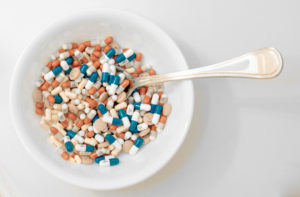From 1999 to 2012 the percentage of Americans on antidepressants increased from 6.8% to 13%, according to a report published this week by the Journal of the American Medical Association (JAMA).
While other studies have reported on the increasing use of prescription drugs in the US in general, those studies have often relied on secondary data sources, such as pharmacy or medical claims reports. This new report on prescription use, first-authored by epidemiologist Elizabeth Kantor of Harvard University, derives its data directly from the population itself using the National Health and Nutrition Examination Survey (NHANES). The survey included results from 37,959 adults over age twenty, but did not include people hospitalized or institutionalized.
The results show an overall increase of prescription drugs, with 51% using one or more prescription drugs in 1999 and 59% doing so by 2002. However, one of the most startling increases was in the use of antidepressants, with use steadily growing at every two-year measuring period.
The study authors comment:
“The increase in use of antidepressant drugs may, in part, reflect shifting attitudes regarding depression.27 Use of SSRIs and SSNRIs markedly increased; notably, use of SSNRIs increased between 1999-2000 and 2005-2006, remaining stable thereafter. Even so, SSRIs remain much more commonly used than the other antidepressant drugs, and the continued popularity of the SSRIs may reflect the availability of several generic options with a wide range of indications and a favorable profile regarding adverse effects. 28”
However, large-scale meta-analyses have challenged the effectiveness of antidepressants compared to placebo and psychotherapy both in moderate and severe depression, and re-analyses of industry trials have also continued to raise safety concerns.
Neuroscience research and reviews of clinical trials have questioned antidepressants’ effectiveness beyond the placebo effect. Imaging studies have revealed that people diagnosed with severe depression show the same changes in brain scans when they respond to a placebo as they do when they take an antidepressant. Similarly, a recent reanalysis of antidepressant efficacy versus placebo in major depression did not find a significant difference in symptom reduction between the active prescription and placebos.
A meta-analysis of antidepressant trials compared to therapy, published in JAMA Psychiatry in September, found no significant differences between antidepressants and CBT in response to treatment or remission in patients with severe depression.
The authors also fail to mention that this increase in the prescription of antidepressants likely includes a large proportion of off-label prescriptions or orders given without an indicated diagnosis. Studies have demonstrated that as many as two-thirds of all prescriptions for antidepressants are given to patients who have never met the criteria for severe depression.
*
Kantor, E. D., Rehm, C. D., Haas, J. S., Chan, A. T., & Giovannucci, E. L. (2015). Trends in Prescription Drug Use Among Adults in the United States From 1999-2012. JAMA, 314(17), 1818-1831. (Full Text)
















Only 13%??? This is scandalous, there is so much to be depressed about that this clearly demonstrates how many people have unconscionably been allowed to fall through the cracks! (Not to mention the hidden and underreported toll of asymptomatic depression: see http://www.bonkersinstitute.org/asymptomatic.html)
Report comment
Exactly, everyone feels depressed sometimes. So everyone can benefit from antidepressants. By the advent of DSM 8, 99.98% of the US population will be on antidepressants full time. Everyone’s chemical imbalances will be being managed by drugs. It will be so great! The only people not on antidepressants will be psychiatrists and those crazy MIA members who think drugs don’t work.
Report comment
Assuming Murphy fails, otherwise we may have no choice…
Report comment
“The only people not on antidepressants will be psychiatrists and those crazy MIA members who think drugs don’t work.” LOL
But in reality, we “crazy MIA members” know the antidepressants work. Well, they don’t work for smoking cessation, a “disease” for which they’re prescribed. But when you go off them, you do get the common symptoms of antidepressant discontinuation syndrome:
“Commonly reported symptoms include flu-like symptoms (nausea, vomiting, diarrhea, headaches, sweating), sleep disturbances (insomnia, nightmares, constant sleepiness). Sensory and movement disturbances have also been reported, including imbalance, tremors, vertigo, dizziness, and electric-shock-like experiences in the brain, often described by sufferers as “brain zaps”. Mood disturbances such as dysphoria, anxiety, or agitation are also reported, as are cognitive disturbances such as confusion and hyperarousal.”
And these symptoms are frequently misdiagnosed as “bipolar,” by ignorant, annoyed, and greedy doctors.
Report comment
Actually, I think it would be interesting to see what percentage of psychiatrists take their own prescriptions. Psychiatrists have one of the highest if not the highest suicide rate among professions. The first Fort Hood shooter was a psychiatrist. Just makes me wonder…
Report comment
I think socioeconomic factors may explain a lot of this…leave it to the medical establishment to completely ignore social context. The economy tanked, the “recovery” isn’t impressive, and we live in an era of incredible inequality. I find it depressing just talking about it, personally.
Report comment
Just hearing about this is depressing. How can people allow themselves to be drugged by these poison cocktails, in light of all the new info, is beyond my comprehension.
They are sentencing themselves to a life of misery.
Report comment